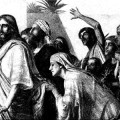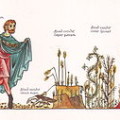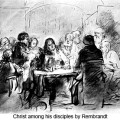7 Herod the tetrarch heard about all that was happening, and he was greatly perplexed because some were saying, “John has been raised from the dead”;
8 others were saying, “Elijah has appeared”; still others, “One of the ancient prophets has arisen.”
9 But Herod said, “John I beheaded. Who then is this about whom I hear such things?” And he kept trying to see him.
Spiritual – “searching” for Jesus
As I read these passages I see several layers of meaning and in one of those layers I see another story-within-a-story. Remember that the pericope headings, as handy as they are, have been inserted by the editor and are not part of Divine Revelation. If we peel away these headings and consider verses 1-17 as a single, unbroken block of text, then I see the outer story as focused on the Twelve and their encounter with the people of the region. Whereas the inner story, to me, is concerned with Herod’s “search” for Jesus.
If this is indeed the case, that is, this structure is a story within a story and is meant to draw our attention to Herod, then we have to ask this simple question: “Really?” I mean, verse 9 tells us that Herod kept trying to see Jesus, but how serious could his efforts have been? Jesus’ apostles – His emissaries to the world – have gone all over the countryside preaching the Kingdom of God, casting out demons, and curing the sick. It’s not like they are flying below the radar or traveling incognito; they’re all over the place and easy to find. Surely Herod could have gotten in touch with one of them and asked “where is your master?” Additionally, we’ll read in the next pericope that large crowds were following Jesus. The crowds always seem to know where He is and they follow Him as much as possible.
How is it that Herod the tetrarch– a man of many resources (tetrarch means he was a ruler of one fourth of the country; he governed Galilee and its neighboring state) – couldn’t find Jesus? For one thing, he is getting bad information. In fact I’ll go so far as to say that Herod surrounded himself with poor sources of information. I’ll bet no one in His court, even if they knew the truth, would tell him “He is Jesus, the Galilean; He is preaching that the Kingdom of God is at Hand and some think He is the Messiah.” There is no way that Herod wants to hear that another kingdom, a different kingdom, is at hand. Recall that his father, Herod I, had all the male infants of Bethlehem killed when he heard that a new king of the Jews (Jesus) had been born (Mt 2:16). Instead Herod’s court tells him that it’s John the Baptist raised from the dead, or that it is Elijah or another prophet. Being surrounded by people who don’t know the truth, or won’t tell the truth, makes it hard to find the truth.
Additionally, Herod Himself says “John I beheaded.” Let’s remind ourselves just who John was. He was the one who called people to repentance and told them to prepare their hearts for the Lord (see Lk 1:76 and Lk 7:27). But Herod had him killed. Again, I say it’s going to be awfully hard to find Christ if you kill the prophets that try to call you to relationship with Him.
There is one thing that is certain: Herod doesn’t know Jesus. He makes that very clear to us when in verse 9 he says “who then is this about whom I hear such things?”
Spiritual – Self Examination
As a quick reminder remember that when asked “who are you in this story?” my good friend said “everyone.” He meant that sometimes we are best symbolized by one person in the story and at other times in our journey we are best symbolized by a different person in the story. That can be an easy perspective to embrace when we read a parable like the Healing of the Paralytic (Luke 5:17-26). Sometimes we’re the paralytic and our friends carry us to Jesus. Sometime we’re the friends and our faith carries a friend to Christ. Sometimes we’re a bystander and we get to see a special moment of grace. When we consider the parable of the Paralytic we get to embrace the joy of the gospel on many levels.
However, sometimes in scripture we encounter a character like Herod. Personally I think, at times, I have been Herod too. (Did you know that I grew up anti-religious?) I “killed” the prophets that tried to tell me to prepare my heart for the Lord and I surrounded myself with sources of bad information concerning Jesus – people who knew less about Christ than Herod’s courtiers.
With all due respect to my friend’s point of view, maybe we’re not literally “everyone” in these scriptural stories. For the devout Christian who earnestly longs to be a true disciple of Christ, I think Herod has been included as an anti-type. He’s exactly who we’re not supposed to be. He’s included so that we can be on our guard and sincerely ask ourselves “am I surrounding myself with poor or with reliable sources of information? Or, as far as it concerns Jesus, have I been surrounding myself with people who tell me what I want to hear about Him? Do I really seek the truth about Jesus? Do I ‘kill’ His prophets when they call me to repentance and call me to prepare my heart for Him? Or instead, do I prepare my heart and do I receive His emissaries with joy?”
Our prayerful response can be to thank God for the emissaries of Christ that He sends into our lives. Also we can pray for the grace to sincerely seek Christ in truth.
Related PostsScripture texts in this work are taken from the New American Bible, revised edition© 2010, 1991, 1986, 1970 Confraternity of Christian Doctrine, Washington, D.C. and are used by permission of the copyright owner. All Rights Reserved. No part of the New American Bible may be reproduced in any form without permission in writing from the copyright owner.




